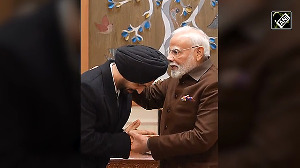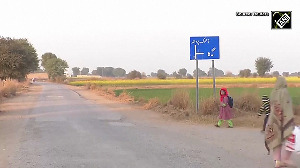Tamil Nadu’s politics returns to being bi-polar, and that’s a good thing, says B Srikumar.

The ruling All India Anna Dravida Munnetra Kazhagam has retained power for a second consecutive time in Tamil Nadu, the electoral charisma of its founder M G Ramachandran finally matched by his protégée and party general secretary Jayalalithaa after 32 years.
Though arch rival DMK has lost the election, it seems to have put up a better show than in 2011 by winning 89 seats. With this the party has reclaimed the leader of opposition status, which it lost in 2011 poll to the Desiya Murpokku Dravida Kazhagam.
Interestingly, the Peoples Welfare Front that had actor turned politician Vijayakanth’s DMDK in it, and which was said to present an alternative to the Dravidian parties AIADMK and DMK, did not win a single seat in this election.
Also, the Pattali Makkal Katchi lost in all the 232 constituencies it contested from; the party’s chief ministerial candidate Dr Anbumani Ramadoss failed to score from Pennagaram in Dharmapuri district. Even the vaunted Narendra Modi magic did not help the Bharatiya Janata Party win a single seat.
DMK chief M Karunanidhi was the real reason for the AIADMK’s victory, his failure to bring all the opposition under one fold and as well as to project his son M K Stalin as his party’s chief ministerial candidate helped Jayalalithaa no end in wresting power once again.
Kopanna, a Congress leader, said, “Karunanidhi failed to consolidate the opposition parties’ strength and allowed the formation of alternative fronts, this was one of the reasons for missing the chance to grab power.”
The DMK’s member of Parliament Trichy Siva agreed. “We failed to bring about unity among opposition parties, our disarray was advantageous for Jayalalithaa.”
The AIADMK chief knew well how to play politics against the veteran Karunanidhi. She has also understood the pulse of the people better and connected better with the downtrodden through her welfare schemes.
Just imagine, 10 political parties were ranged against the AIADMK but Jayalalithaa single-handedly managed to convince the voters to stay with her party. The women realised her struggle and stood solidly by her.
Jayalalithaa’s winning spree has continued since 2011; between the two state elections she also mopped up 37 of the 39 Lok Sabha constituencies in 2014.
The AIADMK’s senior leader and spokesperson Avadi Kumar said, “The performance of Amma’s government and her welfare measures reached the needy and it helped the party retain power. The people of the state, particularly women, have great faith in Amma and her poll promises.”
It’s an amazing victory in a tough battle, says senior journalist Sampath Kumar, “The Amma Unavagams (canteens) and other welfare measures by Jayalalithaa drew the voters in, one can now have three meals a day within 30 rupees. Also, the police department was kept away from party intervention in the last five years.”
There was no visible surge either for the AIADMK or DMK in this election, which flummoxed pundits, and it’s obvious the people quietly given their verdict in favour of Jayalalithaa. There were no major issues before the voter, although prohibition was sought to be made into one. While Karunanidhi promised to close the liquor shops run by the government if elected, Jayalalithaa said she would do it in a phased manner, and the voters accepted her line. This also ensured that at least 10 to 15 per cent of the hardline drinkers stayed with the AIADMK, since they saw no immediate threat of prohibition.
The AIADMK contested in 227 seats (and shared the remaining seven with fringe parties which contested on its symbol), 53 seats more than the DMK which fought in only 174 seats as it had to satisfy its allies as well. Karunanidhi gave his ally Congress 41 seats which, in hindsight, proved too many.
The BJP’s senior leader C P Radhakrishnan said, “Some of Jaya’s freebies and money distribution to prospective voters gave her this victory.”
Usually, the DMK doles out such freebies but this time the party kept away from populism and focused on constructive work. The extensive campaigns by DMK treasurer M K Stalin managed to reduce the gap with the AIADMK, and helped consolidate its hold over Chennai where the DMK bagged 10 seats out of 16.
Stalin said soon after the verdict, “We have accepted the peoples’ verdict but this is the first time the opposition has got sizeable seats, and we will perform responsibly inside and outside the assembly.”
Political analysts feel the DMK failed to grab the opportunity by mismanaging its internal politics, taking no steps to set right the equation with M K Azhagiri, Karunanidhi’s estranged elder son who wields tremendous influence on the party in southern Tamil Nadu, and fielding mostly new faces who failed to connect with the locals.
Except for one opinion poll, all others indicated that the AIADMK would lose this time, but Jayalalithaa was confident of her five-year rule and her fresh promises of freebies did the rest.
With most opinion polls indicating that the party will regain lost ground in Tamil Nadu, the DMK believed in and went with it. Stalin undertook whirlwind campaigns across the state for the last one year and it was his effort that helped the DMK gain 66 seats and boost its voting percentage.
In balance, it’s a win-win situation for both the Dravidian parties. The AIADMK may have retained power but the DMK has managed to expand its footprint and squeeze out any other opposition space claimant. Politics in Tamil Nadu has returned to being bi-polar, and that’s a good thing.
Image: DMK president M Karunanidhi. Photograph: R Senthil Kumar/PTI Photo.











 © 2025 Rediff.com -
© 2025 Rediff.com -